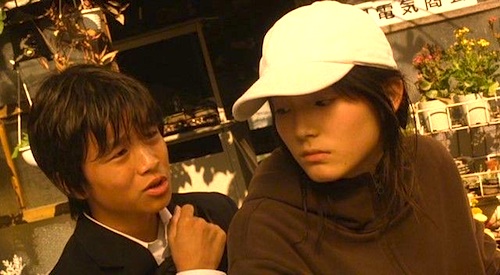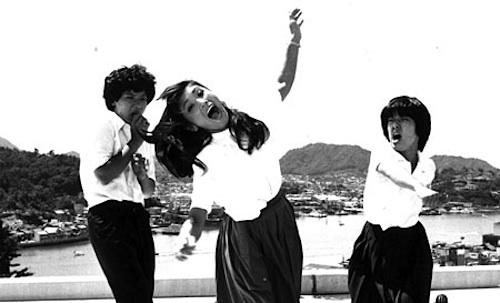
By Joe Bendel. It came nearly six years after the original Freaky Friday, but the body-switch comedy was far from the acknowledged comedy sub-genre it is today. In fact, Nobuhiko Obayashi got into the game early on and he delivered exactly what people wondered about—the experience of suddenly having different private bits. Teenagers Kazuo and Kazumi Saito (no relation) are about to experience the switcheroo and quite a difficult transition it will be for them in I Are You, You Am Me (a.k.a. Exchange Student), which screens during the Japan Society’s Obayashi retrospective.
Obayashi’s picturesque home town, Onomichi, was probably a pleasant place to grow up, because he has frequently returned to shoot films there. Kazumi Saito spent her early girlhood years there and has recently moved back with her family. On her first day of at her new high school, she is delighted to recognize her old playmate Kazuo Saito. However, she inadvertently embarrasses the teen meathead. That will lead to serious bad karma for her when a freak accident somehow causes a body swap. The not particularly introspective Kazuo will make the best of things in her body, but she has a much harder time adjusting to a boy’s life. At least Kazuo’s grades will improve.
It is strange I You, You Me has not been more aggressively marketed as a vintage rediscovery, because it would have been perfect for the body-switch craze of the late 1980s, but also speaks to more contemporary issues of gender identity and sexual orientation. Not surprisingly, during the switch-off, Kazuo is frequently taunted for his supposed homosexual mannerisms, while Kazumi’s mother is frustrated with her sudden tomboyisms.

Satomi Kobayashi is pretty incredible playing both Kazumi as Kazumi and Kazumi while Kazuo is stuck inside her body. She nails the body language of a goony-ish teen boy and just generally radiates energy. It is easy to see why she won best newcomer at the Yokohama Film Festival. On the other side of the coin, Toshinori Omi deserves credit for projecting what must have been a socially risky persona for 1982 Japan (but presumably less so for his successor when Obayashi remade it in 2007). Together, they play off each other in the various personas with real gusto. They largely carry the film, sharing both co-lead parts, but Masae Hayachi is also rather charming as Kazumi’s science fiction reading friend Akemi Yoshino, an all too brief supporting role.
Onomichi looks like the definitive coastal Japanese town, which it sort of is. After all, parts of Ozu’s Tokyo Story and Oshima’s Boy were filmed there. Yet, it still brings back nostalgia for the teen American 1980s, when the best way for parents to understand their kids (and vice versa, so to speak) was to spend time in their respective bodies—even though Obayashi takes it deeper and franker than Hollywood ever did. Recommended as another strangely distinctive coming of age tale from the under-heralded master, I Are You, You Am Me screens this Saturday (11/21) as part of the Obayashi retrospective at the Japan Society in New York.
LFM GRADE: A-
Posted on November 19th, 2015 at 11:23am.